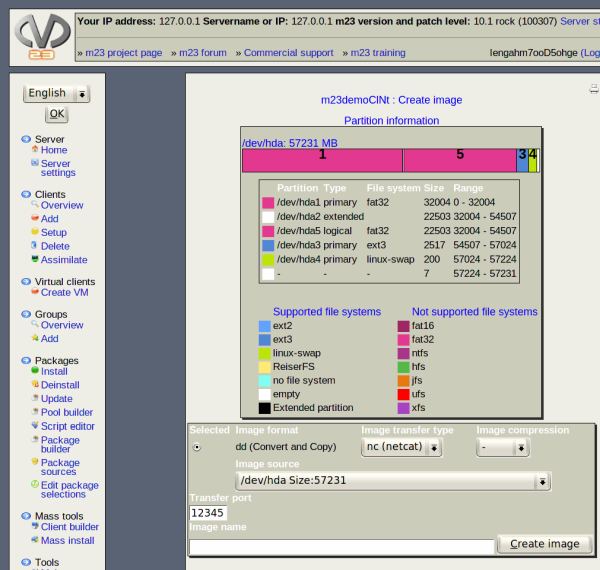m23 is a software distribution and management system for Debian, Ubuntu and Kubuntu. It can install hundreds of clients over an existing network infrastructure. It can manage (format, install, remove and update) software packages.
m23 is controlled via the web browser. The installation of a new m23 client is performed in three simple steps and the integration of existing clients is possible, too. Group functions and mass tools make managing a vast number of clients simple.
m23 is composed of a large number of open source components such as Etherboot, Apache, PHP, BusyBox, MySQL, DHCP, ATFTP and many more.
Features include:
- Web-based administration.
- Three steps to your complete client.
- Integration of existing clients into m23: Existing Debian systems can be assimilated into the m23 system easily and administered like a normal client (installed with m23).
- Group functions: Convenient group functions if you have a large number of clients that need to install new software or if other routine jobs need to be done. For example, a new software package can be installed on all clients or be removed from all clients of a group. In addition, an update or client recovery can be accomplished on all group members.
- Mass installation: The mass installation tools are handy, if you need to install a big amount of clients with similar requirements.
- Free partitioning and formatting.
- Installation of Linux OS on any number of clients (Debian, Ubuntu, Kubuntu, Xubuntu, Linux Mint and Fedora).
- Imaging: Installation using image files: An image file of a partition or entire harddisk can be used to install other clients. These image files are taken from installed clients with all their software packages and settings.
- Support for software RAIDs: Partitions or entire harddrives can be combined into software RAIDs. m23 supports the RAID levels 0, 1, 4, 5, 6 and 10. RAIDs can be used like normal partitions to install operating systems to or to use them as swap or storage space.
- NFS for storing home directories.
- User management with LDAP: User accounts can be stored on a central LDAP server. This increases the ease of use in environments with many clients and a lot of users. The OpenLDAP server is shipped with the m23 server and can be administrated via the highly integrated phpLDAPadmin.
- Pool builder: The pool builder makes it possible to combine software packages from different media (CD, DVD, internet) on the m23 server and convert them to a package source. These package sources can be used to install clients. This can be done without an internet connection or if the internet connection is rather slow. It is also possible to add self-made packages to the pool.
- VirtualBox included, virtual clients can be installed on m23 server and/or clients.
- HalfSister extension makes it easy to add new Linux distributions to the list of systems that can be managed.
- Client and server backup.
- Client recovery.
- Rescue system.
- Graphical desktops: KDE, Gnome, XFce or pure X11.
- Plugins.
Website: m23.sourceforge.io
Support: Manual
Developer: Hauke Goos-Habermann and contributors
License: GNU General Public License v2.0

| Popular series | |
|---|---|
| The largest compilation of the best free and open source software in the universe. Each article is supplied with a legendary ratings chart helping you to make informed decisions. | |
| Hundreds of in-depth reviews offering our unbiased and expert opinion on software. We offer helpful and impartial information. | |
| The Big List of Active Linux Distros is a large compilation of actively developed Linux distributions. | |
| Replace proprietary software with open source alternatives: Google, Microsoft, Apple, Adobe, IBM, Autodesk, Oracle, Atlassian, Corel, Cisco, Intuit, and SAS. | |
| Awesome Free Linux Games Tools showcases a series of tools that making gaming on Linux a more pleasurable experience. This is a new series. | |
| Machine Learning explores practical applications of machine learning and deep learning from a Linux perspective. We've written reviews of more than 40 self-hosted apps. All are free and open source. | |
| New to Linux? Read our Linux for Starters series. We start right at the basics and teach you everything you need to know to get started with Linux. | |
| Alternatives to popular CLI tools showcases essential tools that are modern replacements for core Linux utilities. | |
| Essential Linux system tools focuses on small, indispensable utilities, useful for system administrators as well as regular users. | |
| Linux utilities to maximise your productivity. Small, indispensable tools, useful for anyone running a Linux machine. | |
| Surveys popular streaming services from a Linux perspective: Amazon Music Unlimited, Myuzi, Spotify, Deezer, Tidal. | |
| Saving Money with Linux looks at how you can reduce your energy bills running Linux. | |
| Home computers became commonplace in the 1980s. Emulate home computers including the Commodore 64, Amiga, Atari ST, ZX81, Amstrad CPC, and ZX Spectrum. | |
| Now and Then examines how promising open source software fared over the years. It can be a bumpy ride. | |
| Linux at Home looks at a range of home activities where Linux can play its part, making the most of our time at home, keeping active and engaged. | |
| Linux Candy reveals the lighter side of Linux. Have some fun and escape from the daily drudgery. | |
| Getting Started with Docker helps you master Docker, a set of platform as a service products that delivers software in packages called containers. | |
| Best Free Android Apps. We showcase free Android apps that are definitely worth downloading. There's a strict eligibility criteria for inclusion in this series. | |
| These best free books accelerate your learning of every programming language. Learn a new language today! | |
| These free tutorials offer the perfect tonic to our free programming books series. | |
| Linux Around The World showcases usergroups that are relevant to Linux enthusiasts. Great ways to meet up with fellow enthusiasts. | |
| Stars and Stripes is an occasional series looking at the impact of Linux in the USA. | |
